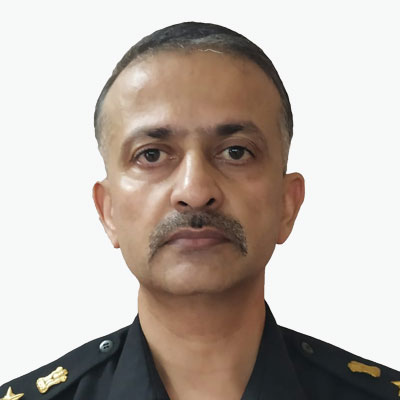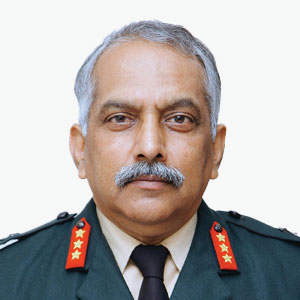DAY 2 / Wednesday, 12 June: Deep Dive Discussion
Track: Defence Geospatial Enterprise
Session Highlight
View RecordingPoints of Discussion
- Role of geospatial technology in enhancing situational awareness
- Contributions of DGDI towards threat identification and prevention
- Impact of real-time geospatial data on military operations and intelligence
- How predictive analysis helps in planning and executing defence strategies
- Integration of AI and ML in Geospatial Technology
Vivek Saxena
Scientist F
DGRE - DRDO
Sh. Vivek Saxena, Sc- F', B.Tech (Computer Science), MBA(Technology Management), and pursuing Ph.D from School of Computer Engineering & Mathematical Science is the team lead for conceptualizing and designing the Enterprise GIS software by customizing the FOSS4G stack. He is having 14+ years of experience in GIS while he has more than 25+ years of R&D experience in various domain including computer vision, machine learning, networking, ERP software etc. He is the author of published work in various national and international, peer-reviewed journal and conferences. He is responsible for fostering a quality management system and all QRS activities in DGRE, Chandigarh since last three years.
Giridhar M Aekbote
Director
Microgenesis
Giridhar M. Aekbote serves as the Director at MicroGenesis Techsoft Pvt Ltd in Bangalore, where he leads the Defence Project Business Unit. His strategic focus on Defence GIS solutions has been instrumental in developing innovative offerings tailored to the unique requirements of Defence GIS applications.
With an illustrious career spanning over three decades in the Indian IT and Geospatial industry, Giridhar is renowned for his exceptional leadership and expertise. He has achieved remarkable success in securing strategic large-scale projects across various sectors.
In collaboration with CAIR DRDO and through technology transfer, he and his team are pioneering the development of indigenous GIS technology, "MICROGENESIS INDIGIS," under the Make in India program. This cutting-edge solution addresses the specific needs of spatial data visualization, analysis, and management across various applications. Its versatility and adaptability mark a significant milestone in India's journey towards self-reliance (Atmanirbhar) in Geographic Information Systems (GIS) technology, catering to both defence and non-defence sectors.
Giridhar and his leadership team are propelling MicroGenesis Techsoft Pvt Ltd towards becoming a key player in providing IndiGIS products and solutions for various strategic and mission-mode Defence Projects, contributing to national security and technological independence.
Matthew Jackson
Solution Architect
Maxar
Mr. Jackson joined Maxar in 2013 and now a Solutions Architect on the
International Government, Defense & Intelligence Solutions Team. Prior to this
role, Matt was a team lead and developer on a number of Maxar programs
supporting the US Department of Defense. In particular, the NSG Open Mapping
Enclave (NOME) and the One World Terrain (OWT) programs where he led the
team developing data conflation algorithms and was the lead developer for the
data and schema translation capability.
Prior to joining Maxar, Matt was part of the Australian Defence Imagery &
Geospatial Organisation (DIGO) where he was the GeoInt dissemination
manager and established the integree Source Strategies Analyst position within
NGA Denver. In Denver, he collaborated with customers and other source
providers to develop comprehensive multi-INT, multi-source strategies to
address US and allied intelligence problems.
Matt is a former Australian Army officer specializing in Geospatial Intelligence.
He has held troop and squadron command appointments, exchange positions
with the US and UK Armies and staff appointments in the Australian Defence
Capability Development Group, Defence Materiel Organisation and DIGO. He
has deployed on operational and United Nations deployments to East Timor and
field survey operations in northern Australia.
He is a graduate of the Australian Defence Force Academy (ADFA) and the Royal
Military College - Duntroon. He earned a BSc in Computer Science at ADFA and
a Graduate Diploma in Land Data Management from the Royal Melbourne
Institute of Technology (RMIT).
Session Highlight
View RecordingPoints of Discussion
- Importance of digital twins in modern military operations
- Role of embedded sensors in monitoring military assets and collecting real time data
- Realistic virtual training scenarios and benefits of virtual training for military personnel
- Emerging trends and advancements in digital twin technology
- Tools and technologies supporting real-time operational insights and resource allocation and Mission Planning
Maj Gen (Dr) Dilawar Singh
Senior Advisor
Indian Centre for Interdisciplinary Studies in Science and Technologies
Major General Dr. Dilawar Singh is a highly decorated and accomplished Indian Army veteran with an impressive array of accomplishments. He holds over 21 degrees and certificates, including a Ph.D. and several master's degrees. As a senior leader, he has been awarded numerous national and international honors, such as Medals from the President of India, the Dr. APJ Kalam Life Time Achievement Award, and the Atal Life Time Achievement Award. General Dilawar has held various leadership positions, including Governor, Director, Advisor, and Top-Level leader on several National and International Boards of Universities and Corporates. He has been involved in numerous national projects and schemes, influencing over 30 million youth across India. He is a keen sportsman, involved in combat shooting, boxing, wrestling, athletics, and aquatics. He has been a strategic advisor for the Paralympic Committee of India and is the President of Para Sports Fdn India and Global Chairperson of Tamo Martial Arts. Currently, he serves as a Senior Advisor at the Indian Centre for Interdisciplinary Studies in Science and Technologies and Senior Vice President of the Global Economist Forum ECOSOC United Nations.
Vishal Anand
COO
Mappls GeoSystems
Vishal Anand is an accomplished professional serving as the Chief Operating Officer (COO) at Mappls Geosystems and will be spearheading Mappls Geosystem product & solution business in India and South Asia region.
He is highly passionate about Geospatial technology and its potential to solve key challenges we are facing today in India through Digital transformation and has spearheaded the growth of GIS technology in India.
He has a rich experience of more than 22+ years working with customers across various segments in National and local government. In his last assignment he was Senior Vice President & Head of Sales & Partner Business at Esri India, wherein he managed multiple assignments across functions such as Sales, Business Development, Partner Eco-system, General Management and Strategy while supporting many National Programmes.
He has been closely involved, consulted and worked with customers on very successful large-scale, mission critical deployment of transformational GIS programs in a variety of areas such as State level GIS programs, National Mapping Organization, e-Governance, water resources, forestry, education, and map production.
Vishal's educational background has played a pivotal role in his success as a business leader. He holds an MBA in Marketing Management and Information Technology, and has comprehensive knowledge in marketing strategies and leveraging technology for business operations. Additionally, he has a certificate in Disruptive Strategy from Harvard Business School, which has equipped him with innovative approaches and a deep understanding of navigating disruptive market dynamics.
Moreover, Vishal's tenure at Oracle enriched his professional experience. His diverse professional journey serves as a testament to his remarkable capabilities in fostering growth, managing key accounts, and spearheading successful business development initiatives. His expertise and accomplishments make him a valuable asset in driving the success of Mappls Geosystems.
Session Highlight
View RecordingPoints of Discussion
- Role of data sovereignty in maintaining control over data and protecting privacy
- Interconnection between Data Sovereignty and Cybersecurity
- The increasing relevance of space security in the context of cybersecurity
- Technological advancements and tools necessary to bolster cybersecurity and, by extension, data sovereignty
- Future potential of AI in constructing attack graphs and improving overall cybersecurity strategies
Cdr Mukesh Saini
Former National Information Security Coordinator (GOI)
Cdr. Mukesh Saini (Ret) has held many information security positions in both public and private sector, over his 30 year career. Having served as a commander in the Indian Navy for 20 years, his latter years were dedicated to his role as India's first national coordinator for information security. Saini has held executive positions at Microsoft, XCySS and Essel Group.
Lt Gen Vinod Khandare, PVSM, AVSM, SM
Principal Advisor
Ministry of Defence
Lt Gen Vinod G. Khandare, PVSM, AVSM, SM (Retd) is currently serving as the Principal Adviser in the Ministry of Defence. He retired from active military service on 31 January 2018 and was the Military Advisor to the National Security Council Secretariat of India at the Secretary level from 2018 to 2021. In his final active military appointment, he served as both the Director General of the Defence Intelligence Agency and the Deputy Chief of Integrated Defence Staff for Intelligence from November 2015 to January 2018.















